
Here are the 61+ Best Multichannel Marketing statistics. The business world, particularly the B2B marketing sector, has undergone a series of evolutionary changes since the COVID-19 pandemic. Despite the existence of sales funnels, companies have been trying a new trend to boost their sales called Multichannel Marketing.
In today’s rapidly growing business landscape, multi-channel marketing has gained a reputation as a cornerstone of success. It is a unique type of marketing that guides businesses toward successful and meaningful customer engagements. The ability to engage with customers across various platforms and channels has become not just a strategic advantage but a necessity. While more and more companies are embracing it in pursuit of their goals, there remains a significant lack of understanding regarding its profound impact on a company’s marketing success.
However, many marketers dive into multi-channel marketing without getting much information about it. In this article, we will explore the essential statistics and uncover the true power of multi-channel marketing in today’s digital era. We will also delve into vital statistics, shedding light on how businesses allocate their marketing budgets, the effectiveness of various channels, consumer preferences, and the ever-evolving trends within this dynamic domain.
What is Multi-channel Marketing?
Multi-channel marketing involves targeting and interacting with customers via numerous marketing channels. This strategy encompasses direct, offline methods and indirect digital marketing approaches. These multi-marketing channels include but are not limited to:
● Search Engine Optimization (SEO) boosts your online visibility and makes it easier for potential customers to find you.
● Physical stores where customers can experience products and services physically.
● Social Media, which provides an interactive platform for engagement, user-generated content, and brand promotion.
● Direct mail, although traditional, is essential in reaching out to a demographic less inclined toward digital communication.
● Pay-per-click (PPC) ads allow effective advertising to target online audiences.
● Influencer marketing utilizes the following of famous individuals to sway potential customers.
● Emails are used for delivering personalized messages to your customers.
With the digital revolution and the increase in online shopping behaviors, customers’ preferences are branching out from solely offline retailers or single online platforms to a wide array of platforms. Old-fashioned methods like Television commercials or long-form email promotions no longer hold the appeal they used to. If you want to attract and retain customers, Multi-channel marketing’s diverse engagement strategy is the best option.
The chief aim of multi-channel marketing is proactively reaching out to consumers wherever they are located—be it social media, emails, websites, or physical stores—rather than passively waiting for them to come to you. This approach provides customers with increased options for interaction with your business, allowing for heightened engagement and enhanced customer retention.
61+ Best Multichannel Marketing Statistics
State Of Multi-channel Marketing
Projected to expand at a CAGR of 22.3% by 2030, the multi-channel marketing sector shows no signs of slowing down. Predictions indicate it will escalate to $28.6 billion worth by 2030. A significant driver behind this growth is the increased usage of mobile devices by consumers for making brand purchases. (source)
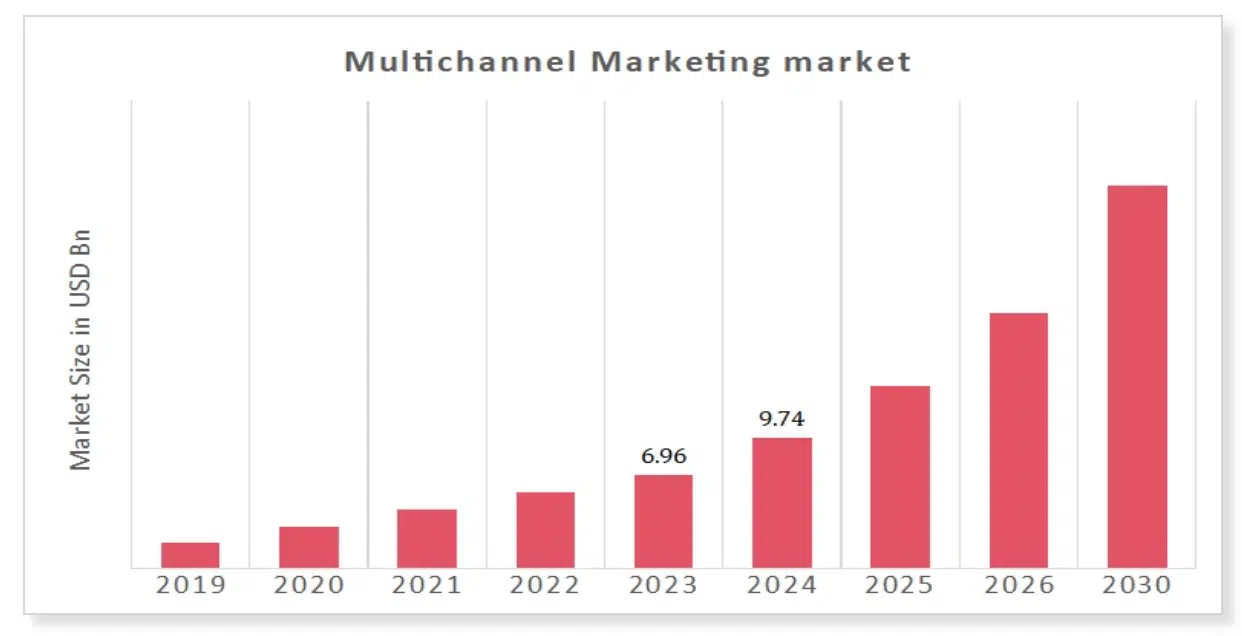
multi-channel marketing sector
Only a fraction, around 30%, of marketing professionals exude high confidence when it comes to executing multi-channel marketing strategies. This relatively modest figure suggests that most marketers may still be grappling with the challenges of implementing a coherent strategy across various channels. (source)
A large percentage of marketers, roughly constituting 67%, reported a moderate level of confidence when handling multi-channel marketing strategies. (source)
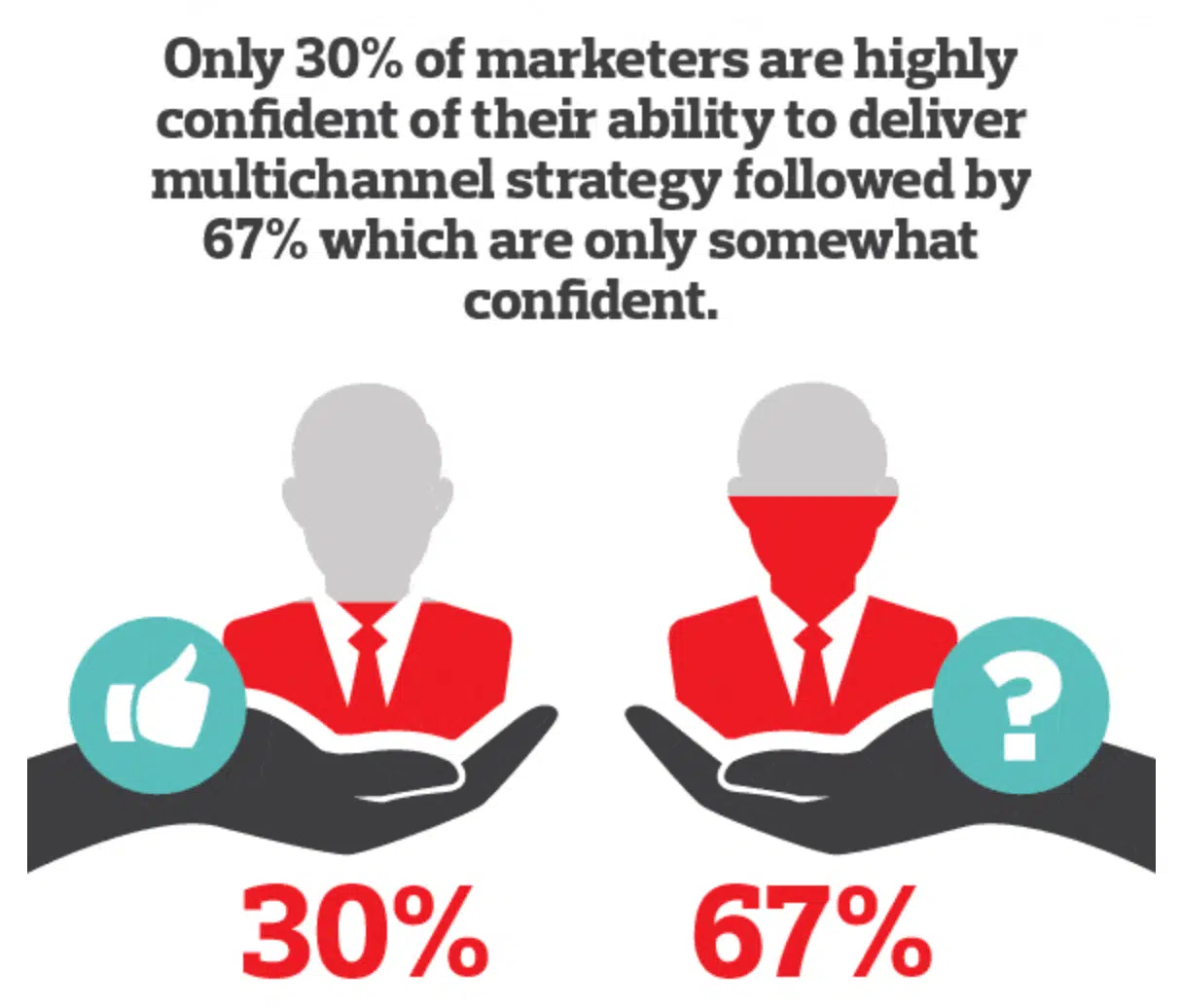
A large percentage of marketers, roughly constituting 67%, reported a moderate level of confidence when handling multi-channel marketing strategies
Marketers typically utilize between 3 and 4 communication platforms, although this figure is average. Data reveals that over half of marketers, 52% to be precise, employ between 3-4 channels for marketing. The more diverse your channel usage, the greater your return on investment and potential audience reach. (source)
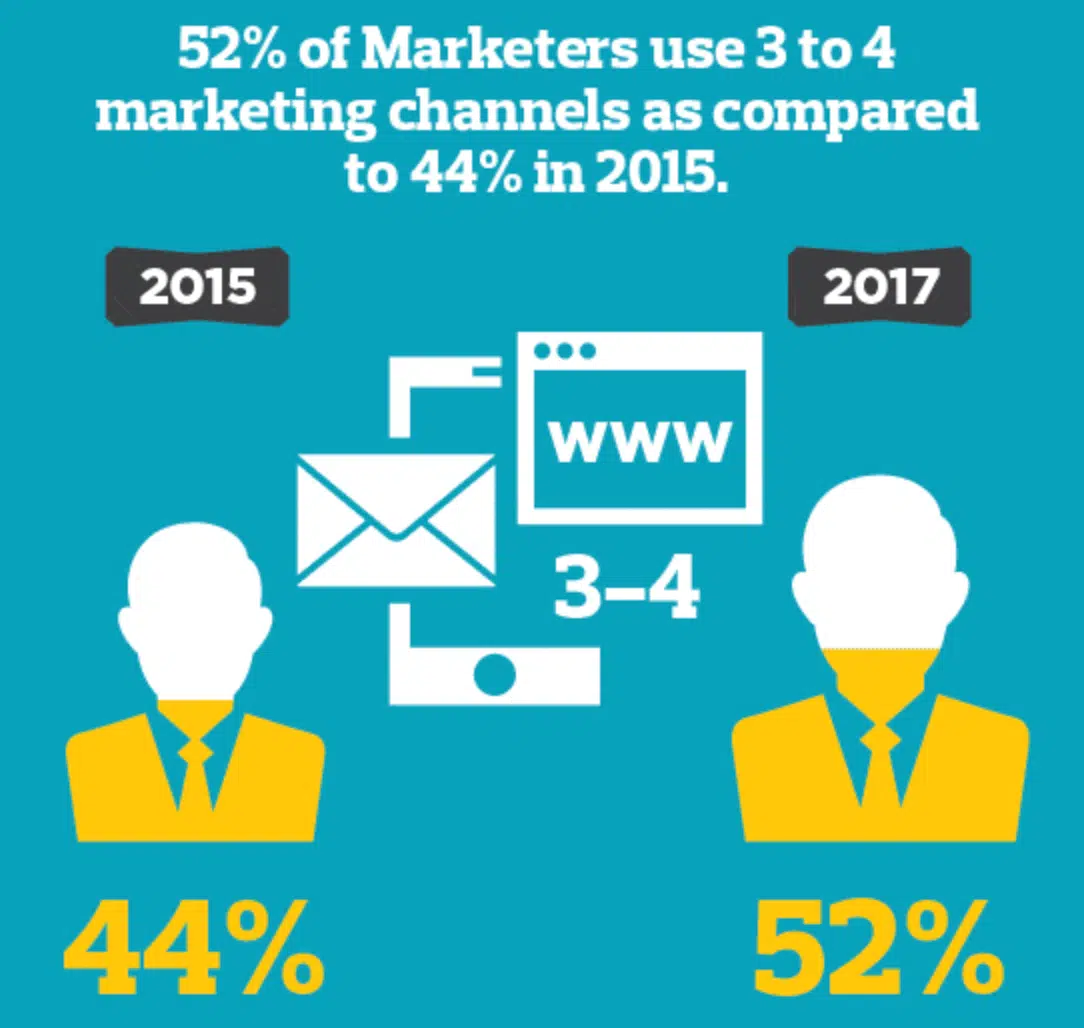
Data reveals that over half of marketers, 52% to be precise, employ between 3-4 channels for marketing.
Based on the latest market data, the revenue generated from multi-channel TV advertising across the globe is predicted to increase to $43.1 billion in 2022, which is higher than the estimated $40.7 billion for 2021. By the end of 2025, this number is anticipated to rise even further, nearing $45 billion. (source)
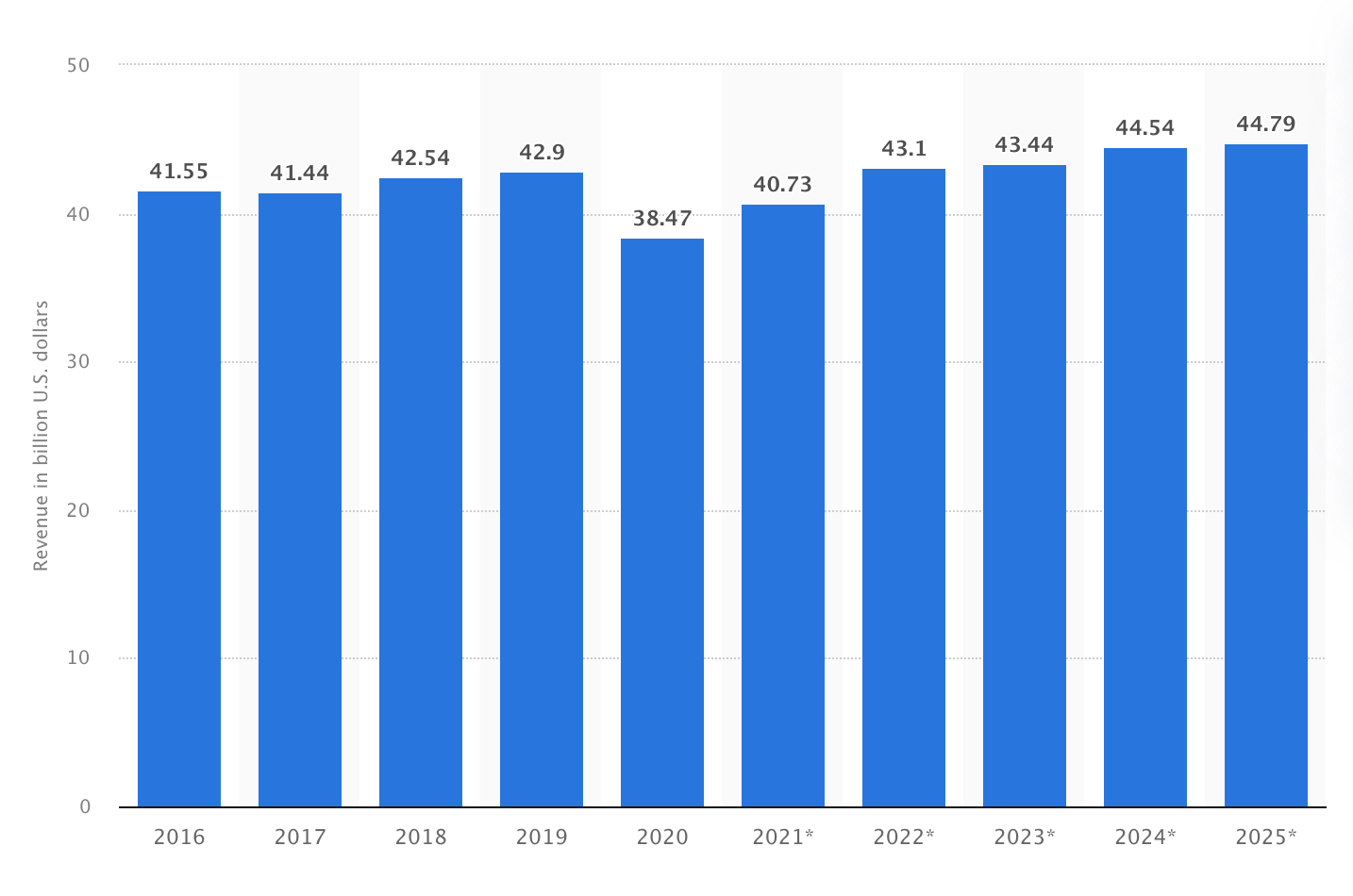
According to 43% of marketers, integrated or unified marketing technology is essential to a successful multi-channel marketing strategy. (source)
31% of marketers prefer a marketing automation strategy to measure marketing performance accurately. (source)
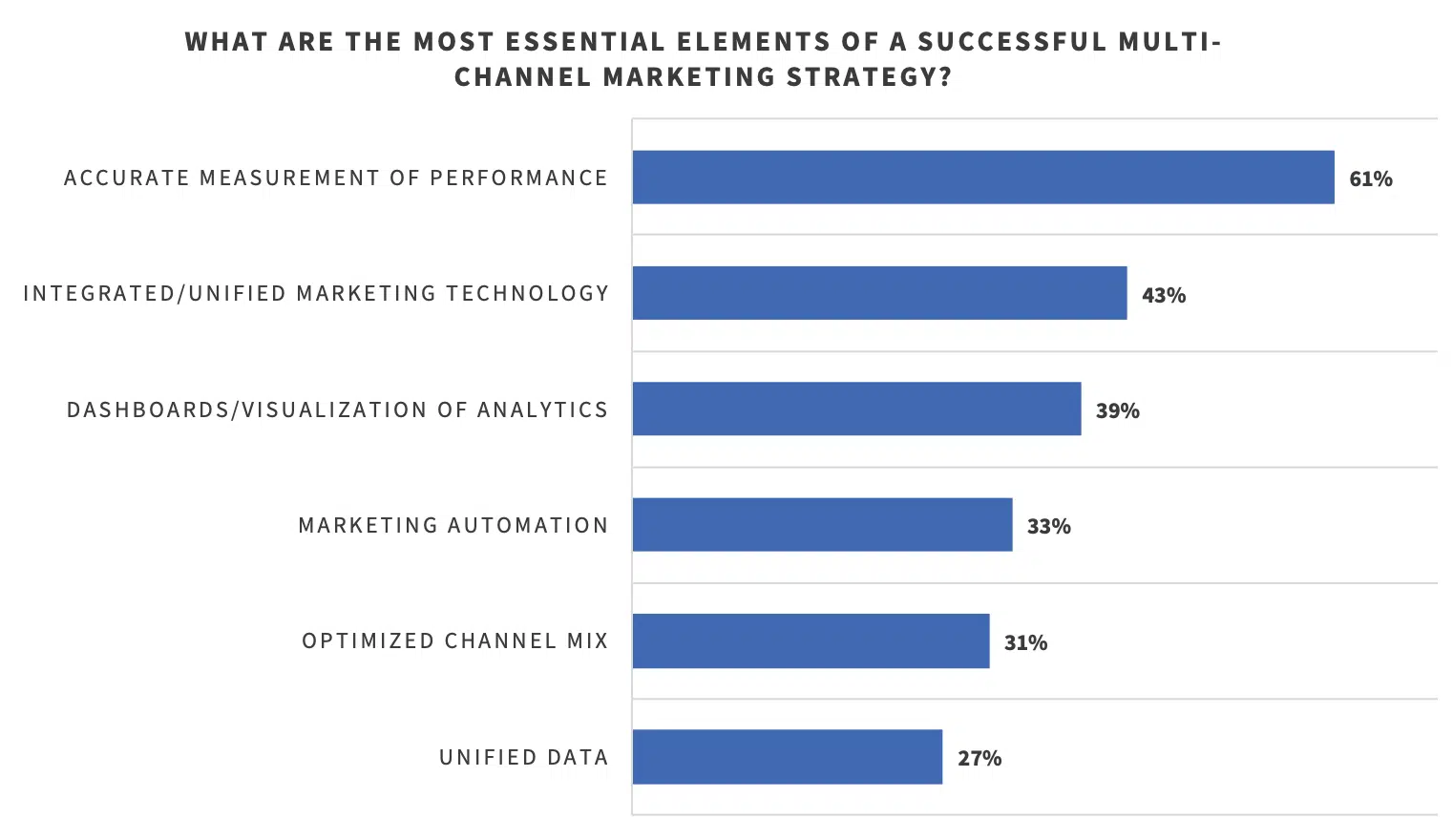
31% of marketers prefer a marketing automation strategy to measure marketing performance accurately.
Email marketing is a viral marketing strategy chosen by more than 90% of marketers. (source)
The number of marketing channels grew by 77% in 2020. (source)
A diverse range of channels is utilized by 84% of marketers in their multi-channel campaigns. (source)
87% of retail leaders agree that multi-channel marketing is essential to business success, but only 8% claim to have successfully implemented it. (source)
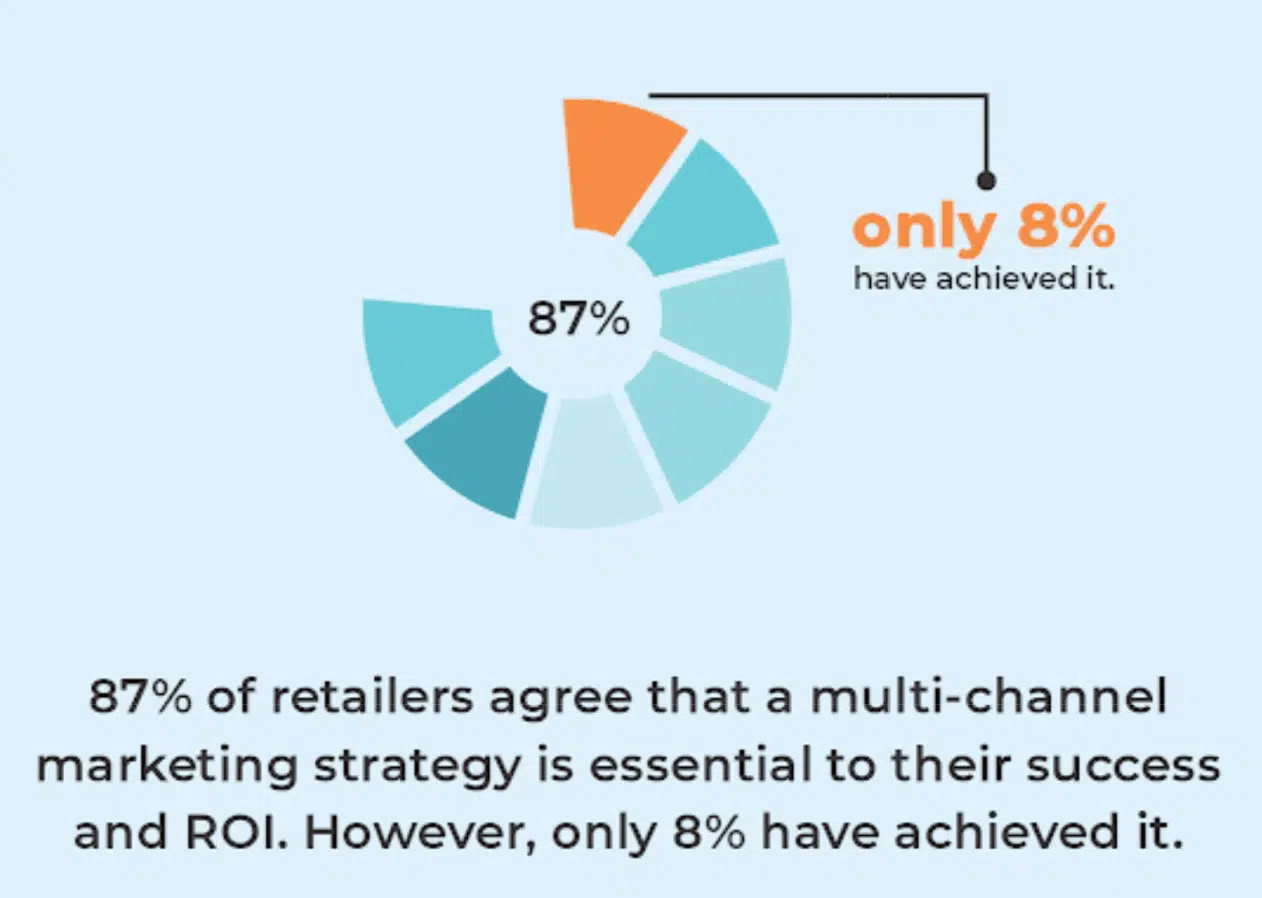
Only 12% of retailers claim to have the necessary technology to support their multi-channel marketing strategy effectively. (source)
73% of marketers believe that data accuracy is responsible for the success of a multi-channel marketing strategy. (source)
70% of users believe understanding the audience’s needs is a good measure of a successful multi-channel marketing strategy. (source)
According to 58% of marketers, branding is the most influential factor to consider when determining the success of a multi-channel marketing strategy. (source)
Businesses that employ multi-channel marketing have a significantly higher chance, roughly 89%, of providing valuable education to their audience. (source)
48% of marketers have expressed that their primary goal in multi-channel marketing is to enhance general brand awareness. (source)
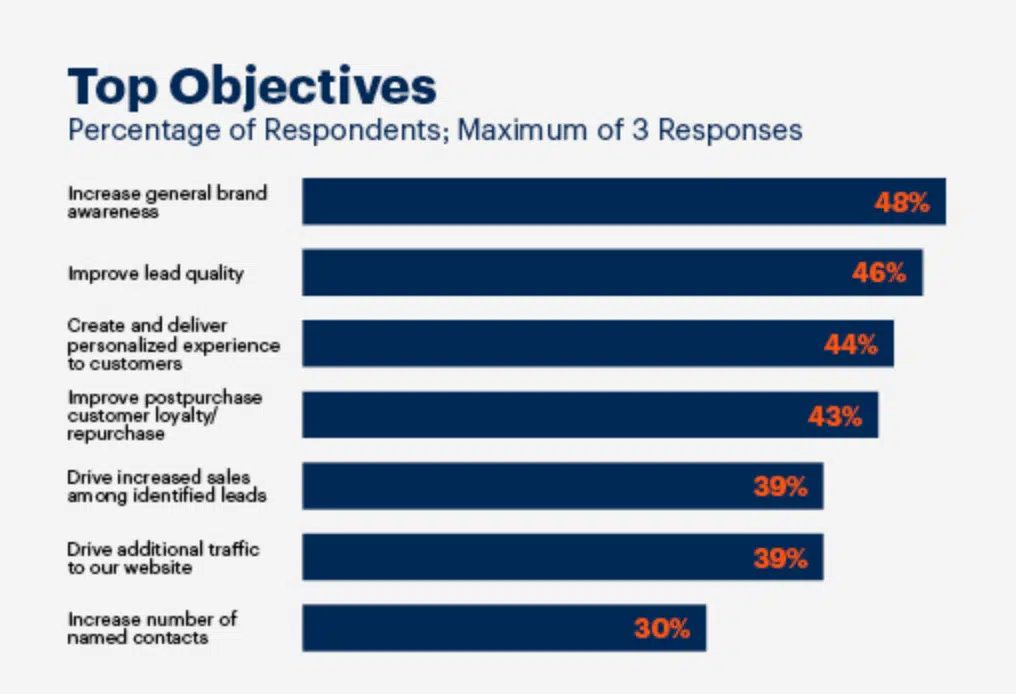
48% of marketers have expressed that their primary goal in multi-channel marketing is to enhance general brand awareness.
14% of companies claim to be currently running well-coordinated marketing campaigns. (source)
According to 46% of marketers, improving lead quality is their top multi-channel marketing goal. (source)
Over 50% of marketers have achieved an impressive return on their investment (ROI) via multi-channel marketing. (source)

Over 50% of marketers have achieved an impressive return on their investment (ROI) via multi-channel marketing.
55% of marketers believe that social media will impact their business growth the most. (source)
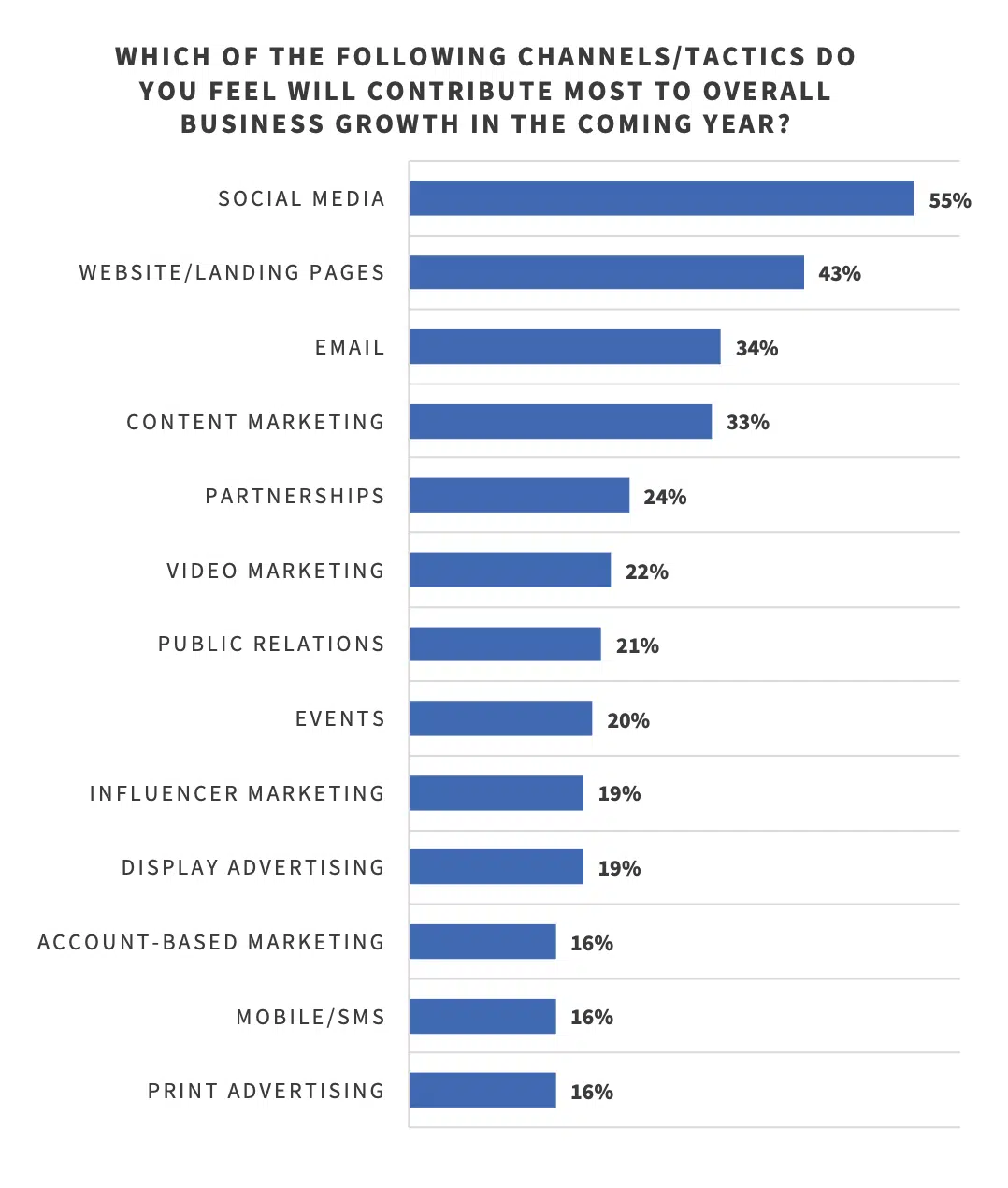
55% of marketers believe that social media will impact their business growth the most.
Millennials and Gen Z, who use the Internet usually have around 8.5 social media accounts. Social media is an effective multi-channel marketing strategy as companies can advertise on platforms like Instagram, TikTok, etc. (source)
43% of marketers consider websites and landing pages practical multi-channel marketing tools to boost business growth. (source)
Customers who shop across multiple channels spend 3-4 times more money than those who only use a single channel for their purchases. (source)
Over half of surveyed consumers (51%) prefer to check online if a product is available in stores before shopping. (source)
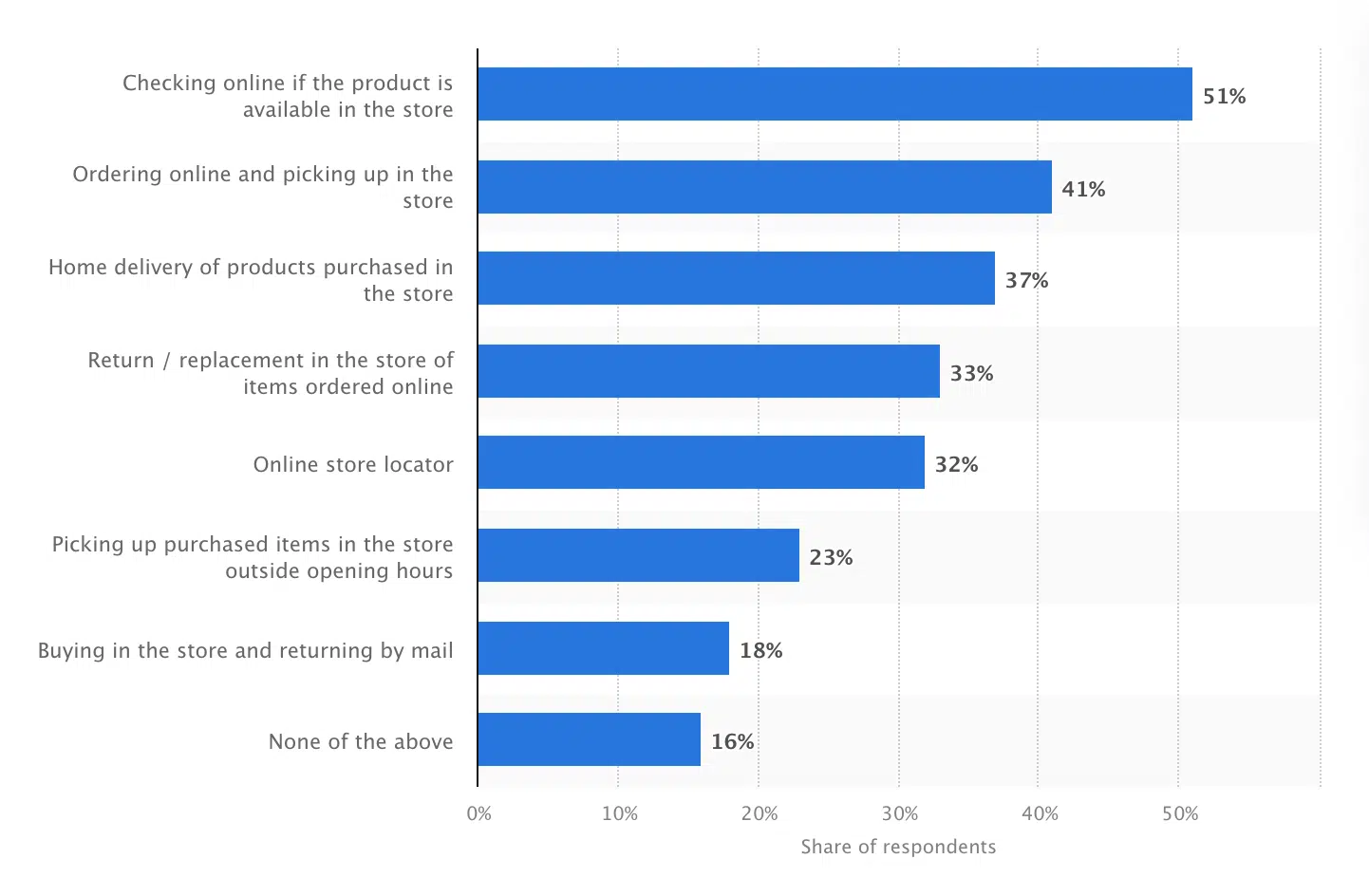
According to a survey, 72% of customers prefer engaging with companies through different marketing platforms. (source)
Office Shoes, a retail shoe company in the UK, significantly increased their email open rates and click-through rates by using multi-channel data to divide their customers into segments. Specifically, their open rates rose by 64%, while their click-through rate saw an impressive growth of 240%. (source)
Content marketing is currently being used by 91% of B2B businesses. (source)
In 2023, approximately 46% of businesses intend to expand their content. (source)
86% of shoppers acknowledge switching between at least two marketing channels before finalizing a significant purchase. (source)
92% of individuals who access the internet worldwide do so through mobile phones. These mobile phones account for more than 60% of internet traffic. (source)
If a brand provides a poor experience, approximately 33% of its customers will end their relationship. This is why it is essential to maintain a smooth and practical multi-channel marketing approach. (source)
Video content currently accounts for over 63% of mobile traffic and is projected to increase to 76% by the year 2025. (source)
Multi-channel Marketing Challenges
21% of marketers lack the understanding to develop effective multi-channel campaigns. (source)
About 23% of marketers say they lack the time and resources to implement multi-channel marketing strategies. (source)
In a recent survey, 37% of marketers say that data quality is the major factor stopping them from achieving efficient multi-channel marketing strategies. (source)
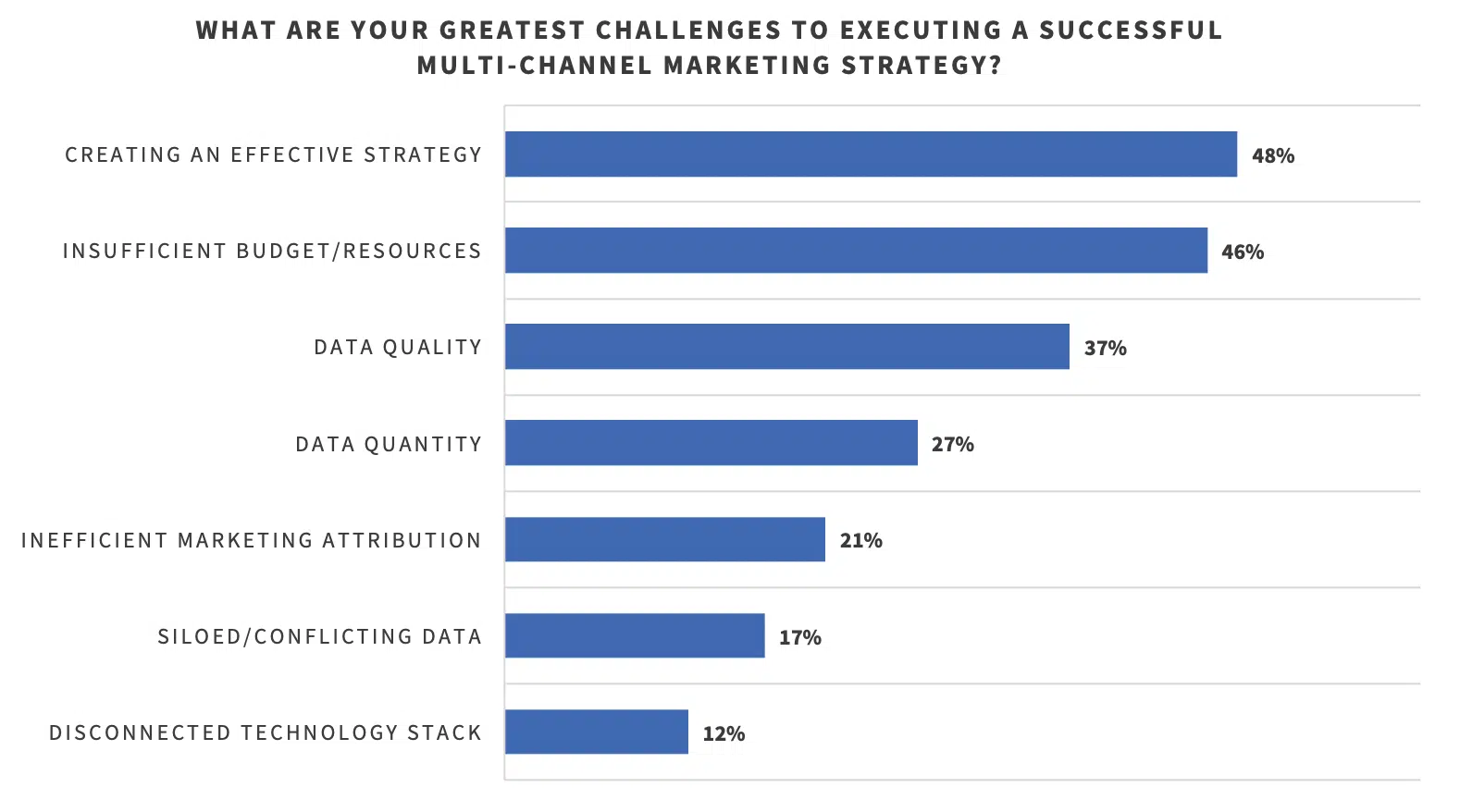
- 11% of marketers experience difficulty in rolling out multi-channel campaigns. (source)
- Around 40% of surveyed marketers acknowledge that their primary challenge in multi-channel marketing is their capacity to connect with customers at the right time effectively. (source)
- 46% of surveyed marketers cite insufficient budget as their main multi-channel marketing challenge. (source)
- 23% of marketers face pressure from the board of directors to adopt multi-channel marketing. (source)
- Roughly 61% of customers face challenges moving from one customer service provider to another. (source)
- 21% of marketers lack the investment in tools to utilize multi-channel marketing. (source)
- 48% of marketers consider creating an effective strategy their most significant challenge to executing a multi-channel marketing strategy. (source)
- 21% of marketers say inefficient market attribution is a significant challenge preventing them from using multi-channel marketing effectively. (source)
- 83% of marketers claim that consolidating customers’ data is becoming more complex, particularly when customers have multiple identities on various platforms. (source)
How Effective is Multi-channel Marketing?
- About 67% of marketers admit that their multi-channel marketing strategy is moderately successful in assisting them in reaching their strategic business goals. (source)
- 23% of marketers say that their multi-channel marketing strategy is highly effective in growing their business. (source)
- Businesses using 4-6 multi-channel marketing to connect with customers claim to experience 77% of customer response rates. (source)
- Only 10% of surveyed marketers claim that their multi-channel marketing strategy is unsuccessful in helping them reach their business objectives. (source)
- During the COVID-19 pandemic, there was a significant increase of 208% in customers’ online orders that were placed and collected at physical stores. (source)
- 50% of the multi-channel marketers say they consistently meet or exceed their financial goals. (source)
- According to a survey, 84% of marketers believe incorporating direct mail into their multi-channel marketing strategy boosts their overall performance. (source)
- Companies that utilize integrated multi-channel marketing strategies are three times more successful than companies that don’t. (source)
- 86% of marketers believe that multi-channel marketing is becoming increasingly influential. (source)
- 66% of marketers admit that they experience higher ROI using direct mail. (source)
- 77% of marketers say they get increased customer response rates with direct mail. (source)
What Do Customers Think About Multi-channel Marketing?
When choosing an effective multi-channel marketing strategy for your business, you need to consider your customers’ opinions on different marketing tools. To help you out, we have gathered some statistics based on customer reviews of different multi-channel marketing strategies. They are:
- Approximately 75% of customers desire a consistent experience regardless of the channel through which they engage with the company. (source)
- 73% of shoppers prefer using multiple channels for their shopping needs. (source)
- Research indicates that the majority of shoppers typically visit a physical retail store. However, interestingly, 46% of these shoppers also engage with retail websites while they are still inside the physical store. (source)
- 89% of customers are frustrated about explaining the same issue to multiple customer representatives. (source)
- More than 70% of consumers believe that companies and sales representatives should work together to avoid repeating information to multiple sales reps. (source)
- 67% of B2B customers depend on content when researching and making purchase decisions. (source)
Latest Multi-channel Marketing Trends
Multi-channel marketing is a popular strategy among organizations and businesses as it helps enhance customer experiences and foster stronger relationships across various interaction points. By utilizing multiple marketing channels, companies can reach their target audience through various media such as social media, websites, emails, and traditional advertising.
However, the most effective approach to multi-channel marketing is known as omni-channel marketing. Omni-channel marketing seamlessly integrates all the channels to ensure a satisfactory and unified customer experience. Past research has shown that companies that use omnichannel strategies tend to perform better in customer retention than those using a less effective approach.
When businesses implement an omnichannel marketing strategy, they ensure that their customers receive consistent and personalized interactions regardless of the channel they choose to engage with. This approach results in a more holistic and satisfying customer journey, leading to increased customer loyalty and overall success for the company.
Multi-channel marketing means more than just putting ads out on different platforms and hoping people see them and respond. It requires careful planning to avoid wasting time and resources without getting the desired results. An effective multi-channel marketing strategy requires a strategic and intentional approach rather than relying on luck.
Successful multi-channel marketing involves thinking about things like who your target audience is, which platforms to use, making sure your messages make sense across all channels, and using coordinated tactics to engage people. By considering these things, you increase your chances of reaching the right people in the right places, at the right time, and with the right message. It also means keeping track of how each channel performs so you can learn what works best and make smarter decisions for future campaigns.
The following are the best ways for you to make the most out of your multi-channel marketing strategy:
- Be consistent with your content: Every day, we encounter many advertisements. With more than 6,000 ads vying for your customer’s attention, your customer will find it easy to ignore them, including yours. There is a lot of competition in the market, and if you don’t make yourself stand out, you might get overlooked. In digital marketing, the most important thing is the content you create. This content carries your main message and determines how successful your marketing efforts will be.Different platforms require different marketing strategies in multi-channel marketing, but the key messages should remain consistent. Your pictures on Instagram, videos on YouTube, and posts on Facebook should all carry the same content and convey the same message.
- Get Familiar with your Audience: Before starting your business, it is essential to understand and study your customer data. This means figuring out who your ideal customers are and where they spend their time. Selling to everyone is ineffective marketing, as you want to target a specific audience.
- Rather than guessing where your target customers are active, it is better to analyze their behavior. Keep track of your interactions and note where you receive the most engagement and feedback. Fortunately, you don’t have to spend much time and effort finding where your target audience hangs out. Tools like Google Analytics can provide insights into which platform drives more leads for your business.
- Use Efficient Marketing Platforms: Not all marketing platforms suit your customers. Just focus on the ones that matter. It is not worth wasting time and energy on a platform your customers barely use. Look at your brand personality and use platforms that fit it. Make sure to keep your brand voice and tone consistent. You can’t be calm and relaxed on one channel and appear forceful and focused on another. This will make your customers confused and not enjoy interacting with you across different channels.

